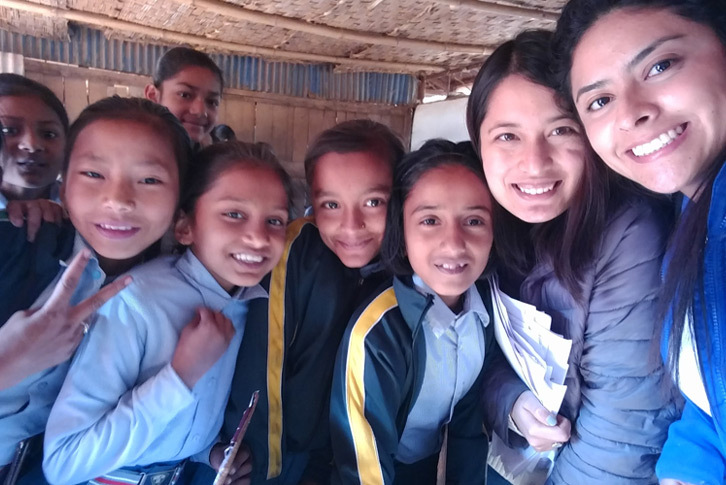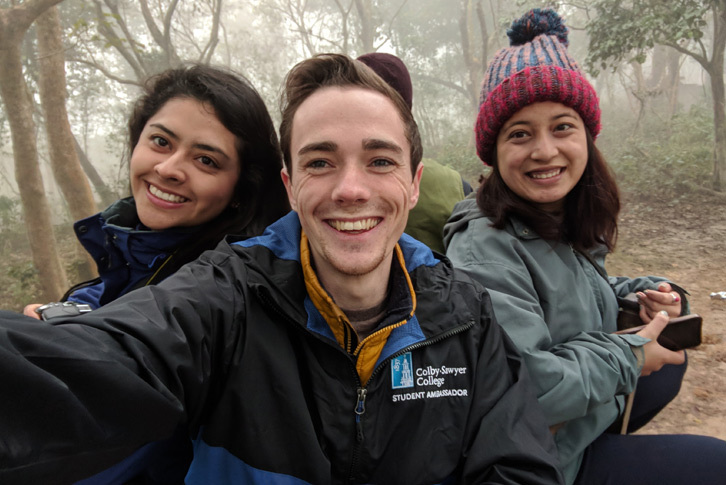Thanks to the efforts of three Colby-Sawyer students, farmers in the rural village of Phidim in eastern Nepal have a thrift store where they can find affordable winter clothes.
Business administration major Barsha Rajbhandari, health care management major Brigitte Ruiz and biology major Ben Maines, all members of the Class of 2018, spent their last winter break as undergrads on a service trip to Nepal after months of planning and fundraising. Rajbhandari arrived first to set up a clothing drive in the capital city of Kathmandu. When Maines and Ruiz joined her, they traveled to Phidim, where Mr. Deepak Prakash Banskota, father of Nishchal Banskota ’15, hosted them.
The Banskotas own a tea estate in the foothills of Phidim and offered a building for the students to transform into the store. The trio applied the funds they’d raised to transport the clothing, refurbish the building and supply the initial wages for a shopkeeper. They also donated educational supplies and held workshops at Phidim Village School.
The trip was a success: five months after their return, the thrift store is going strong and has helped outfit more than 200 farmers. Here, the effort’s leaders reflect on the experience.

Barsha Rajbhandari ’18 of Kathmandu, Nepal
In a span of just seven days in Phidim, I experienced more of my country than in the 18 years I actually lived there. I witnessed an income gap within a three-mile radius that is so vast that a shopkeeper can send his daughter to the United States for higher education, but a farmer in the same village is unable to buy a warm winter jacket. Even with such adversity, there is a sense of peacefulness and happiness within the villagers. The thrift store project will enable farmers to afford gently used clothing.
In many ways, the trip created a new wave of confidence in me. I had not traveled much outside the capital, let alone led a group of people across the country.
Brigitte Ruiz ’18 of Cundinamarca, Colombia
My experience in Nepal changed my way of appreciating life. I was touched by the villagers’ kindness and hospitality. During the workshops at the school, it was so lovely to see the children’s passion and ambition. I remember their curiosity when they first saw us; a lot of them were shy because they had never seen foreigners, but these sweet kids opened their hearts to us as we sang, drew cartoons, took photos and laughed with them.
I will never forget our time playing with those kids. Even though I could not speak their language, I believe in the language of love, and this is what I felt as we interacted. Saying goodbye was not easy, but it’s fulfilling to see that we met our goal to establish the thrift store and that it has been useful for the farmers. I look forward to returning to Phidim.

Ben Maines '18 of Abbott, Maine
Experiencing the generosity of our college and local community that made this trip possible was invigorating. Working through the challenges of scheduling and planning and dreaming pushed me in ways I had not imagined.
The sincere and heartfelt warmth that Barsha’s and Nishchal’s families showed was humbling, and the entire stay was marked by smiles and goodwill. Everyone there who helped us along the way were equally as welcoming, always ready to help answer questions and make our dreams a reality.
One of the most incredible aspects of the trip, however, was the time spent with the children at the tea farm and at the school. The tangibility of the work we were able to do was so rewarding. To me, the trip represents what can be done when ideas are allowed the space and resources to run away with us.
To learn more about the project, watch a video Maines made at youtu.be/QA3tdRZMr8g.